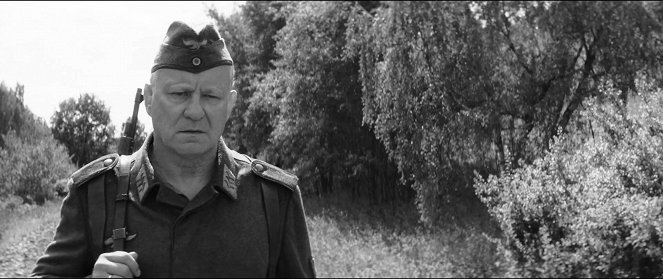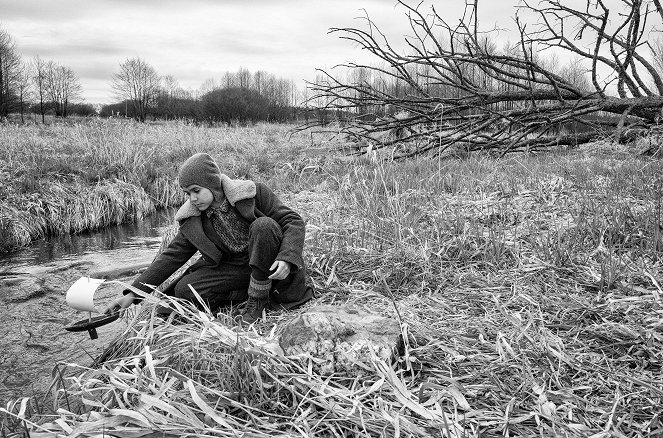Directed by:
Václav MarhoulScreenplay:
Václav MarhoulCinematography:
Vladimír SmutnýCast:
Petr Kotlár, Udo Kier, Michaela Doležalová, Zdeněk Pecha, Lech Dyblik, Jitka Čvančarová, Stellan Skarsgård, Harvey Keitel, Julian Sands (more)Plots(1)
The film follows the journey of a boy, entrusted by his Jewish parents to an elderly foster mother in an effort to escape persecution. Following a tragedy, the boy is on his own. Wandering through the desecrated countryside, the boy encounters villagers and soldiers whose own lives have been brutally altered, and who are intent on revisiting this brutality on the boy. When the war ends, the boy has been changed, forever. (Eureka Entertainment)
(more)Videos (4)
Reviews (11)
Before the premiere, I had some doubts about whether the director was capable of handling a demanding and controversial subject. He didn't embarrass himself and instead brought out the best of himself and his vision is definitely worth seeing in the movie theater, which cannot be said about the overwhelming majority of Czech films. Marhoul managed the production perfectly. A film with such a big budget and a concentration of top-notch film specialists and significant foreign actors has been missing from Czech cinema for a whole decade and will probably be missing again for many years to come. The Painted Bird does not represent a trend or a glimpse of better times - it is a solitary work that nothing can follow, and at most, it can serve as a positive example for future visionaries. Marhoul has seen a lot and is not afraid to make use of it. The great camera work by Vladimír Smutný, the black and white material, and the division of the film into chapters reference Marketa Lazarová, and Marhoul consciously build on Come and See by involving Aleksei Kravchenko; cinephiles will surely find many other references, be it to the work of Jan Němec or other classics. The problem is that, despite all his efforts, Marhoul lacks something substantial to become a world-class filmmaker. He is unable to work with the pace and rhythm of the film and he is monotonous and repetitive. My daughter, who accompanied me, admitted after the screening that she was perfectly tuned into the film in the first ten minutes, only to realize with horror that she had to endure another nearly three hours of the same thing. If the director had shortened the film by half an hour, nothing would have changed in its essence and any viewer without knowledge of the source material would not have noticed. The Painted Bird is a sequence of beautiful film images that I approvingly nod my head at, but they evoke almost no emotions in me (if they do, then it is in inappropriate places. The torture, rape, and perversion sometimes reach the point that even the famous Marquis de Sade would find erotic pleasure in them. I had fun during the scenes of the two insatiable nymphomaniacs, but otherwise, it's not what the director had in mind.) A film full of tragedy and violence should completely crush me emotionally - with Volhynia, Come and See, or Nanking, that eventually happened. Not here, though. The main character goes through hell with the same absent expression, and the viewer cannot empathize with his thinking. More dialogue is missing, as well as depth. I feel like a member of an inventory commission who checks off item after item, one shot after another, and thinks about how nicely the director, as the chairman of the commission, prepared it for him... Sometimes I pause, for example when I watch the scene of a village being massacred by collaborating Cossacks, while the Red Army is attacking them from behind. In their situation, I would have completely different worries... In my opinion, Marhoul somewhat overestimated his abilities, but I consider four stars as a fair share of encouragement that Czech cinema desperately needed. Overall impression: 70%.
()
(less)
(more)
I think the controversy over The Painted Bird is largely an inflated bubble, and I think those leaving audiences in Venice were leaving mainly because they were bored and it wasn't the film for them, it's just that when someone asked them the reason, they just didn't want to be embarrassed and made excuses for the unbearable brutality and that was that. I'm not saying the film is a pleasant spectacle, it's certainly not, but it's a great spectacle and Václav Marhoul has a point. So while there are ugly things happening on screen, there's almost never a need to show them directly in an attempt to shock as much as possible; many times the silence before the storm is even more uncomfortable, or the mere sound of something just happening out of frame. Perhaps what I like most about The Painted Bird, though, is that it's entirely a world film, even though it doesn't try to be one. It’s not exhibitionistic, it remains focused on telling the sordid tale of a journey from darkness to light, aided by excellent actors as much as by Vladimír Smutný's breathtaking cinematography and Marhoul's beauteous direction. It's not for everyone, but that's okay.
()
Ideally, Czech cinematography should have a big, ambitious film like this at least a couple of times a year, so one The Painted Bird wouldn’t get such an aura. But we don’t have that and with this work Marhoul is objectively several streets head of any recent Czech competition, and they simply can’t catch him. A great and stylish film, world-class. I didn’t enjoy it enough for a five-star rating because it’s not really possible to “enjoy” it. It is exhausting, rather. But a well earned four starts, without any doubt. Now, to create a media aura around this film as if it was some sort of exploitation war horror movie is incredibly absurd. Sure, there are some horrible and monstrous things, but Marhoul approaches them with a lot of decency, with chastity almost. And if the hysterical responses from Venice are anything to go by, it's just that the snobs from these big festivals like to fall into cheap headlines ... and that crap will last.
()
The biggest problem is that the whole movie is cold as a dog's snout. The much-proclaimed (swooning festival-goers, women running out of the theater) and mentioned explicitnesses are only rarely impressive in their own right – for me the highlight was ironically the sumptuous camera shot at the beginning of the film, when the main character is launching a boat down the river and the camera takes the whole scene nicely from the surface of the river upward in a kind of "aerial arc". The problem might also be (for me) that I was expecting a completely different film. After the reviews from Venice I was expecting agony, but honestly only one single scene stuck with me a bit, the one from the barn (I won't spoil it, it takes place in the second half of the film and one of those involved is a crazy woman), otherwise everything kind of happened and I kept saying to myself: "Okay, we've ticked off non-consensual sex, next we'll have murder, then abuse, and what's next, Václav?" The film suffers terribly from its format, where it wants to be poetic on one hand (and in which it succeeds to some extent, thanks to the black and white imagery and some really nicely shot scenery) and at the same time convey a powerful and intimate message. "Storytelling through images" is an art in itself, but Marhoul has simply not yet grown there compared to the world's best. I've read in reviews that the biggest difference from the book is the lack of the main character's inner monologues. I dare say (and I haven't read the book) that if Marhoul had retained these at least in part, all of The Painted Bird could have had a much stronger emotional charge. In this film adaptation, there are "just" unpleasant things happening, with a young and "different" boy running around in between it all as he really just tries to survive and get back home (whatever that means). And the psychological evolution of the boy into his tougher self is so terribly cheaply rendered that it felt like downright shoddy work from Marhoul. The film has no proper psychological or emotional depth. There is, of course, a strong social motif, where the black and white shots of the demonic faces of the lifeless villagers are quite chilling. But the whole of The Painted Bird still suffers from a spasmodic episodicity that hopelessly undermines any more powerful lasting impression. Too bad; I'd like to give it more, but I just can't. Still, I must say that I doff my cap to Marhoul, because once again he has put us in a wider awareness than just from Aš to Krnov. The most emotional part of the whole film is that Slavic song in the closing credits.
()
After Tobruk, Václav Marhoul convinced me for the second time that he and I are simply not on the same wavelength. Now, after the almost three-hour ‘frantic ride,’ I can’t help but wonder what he wanted to convey with this film. Next to Come and See and Hatred, The Painted Bird feels rather underwhelming. The information that the story takes place during WWII came to me only in the form of a Storch flying over, other indications appeared much later. I still don't know where the story was set (Carpathian Ruthenia?). I also didn't understand why the little Jew was played by a Gipsy. The story unfolded in a very awkward way. Throughout the film I felt like it was weirdly cut, I was annoyed by its strange rhythm: boring, boring, boring - brutal violence - boring, boring, boring - brutal violence - boring, boring, boring – pedophilia - boring, boring, boring - zoophilia, etc. I also didn't understand why there was violence in the film in the first place when the creators were obviously more afraid of it than the viewers. That way, most scenes look silly bordering on ridiculous. For example, the completely pointless zoophilia scene had me in stitches, Václav Marhoul can't have been serious. On the other hand, if Fifty Shades of Grey gives you goosebumps, this will be a rough experience for you, which might even lead to some involuntary bedwetting. At least I already know what those awards were for. Wait... actually, I don't. P.S. Those bikini tan lines on Denisa Pfauserová sure looked historically accurate :-)
()


